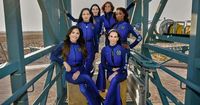On April 14, 2025, Blue Origin, the space company founded by billionaire Jeff Bezos, made headlines with its latest suborbital flight, NS-31, featuring an all-female crew. This mission marked a significant milestone, as it was the first all-women spaceflight since Soviet cosmonaut Valentina Tereshkova's historic solo journey in 1963.
The flight launched from a cosmodrome in West Texas, USA, at 13:30 GMT (16:30 Moscow time) and lasted approximately 10 minutes and 30 seconds. The crew included six remarkable women: pop singer Katy Perry, CBS Mornings host Gayle King, civil rights activist Amanda Nguyen, film producer Keriann Flynn, former NASA rocket scientist Aisha Bou, and mission leader Lauren Sánchez, who is also Bezos' fiancée.
As the New Shepard rocket ascended, it quickly passed the Karman line, the recognized boundary of space, reaching an altitude of about 106 kilometers. Two and a half minutes after launch, the capsule detached from the carrier rocket, allowing the crew to experience several minutes of weightlessness.
After their brief adventure in space, the capsule returned to Earth, landing safely with the help of parachutes and a rocket decelerator. Upon landing, the crew emerged from the capsule, with Katy Perry famously kissing the Texas soil. "I’m so proud of this team," Sánchez said tearfully after the landing. "I can’t express it in words." She described the Earth as looking "so quiet, but very alive," a sentiment shared by her fellow crew members.
Gayle King noted that the most memorable moment for her was hearing Katy Perry sing Louis Armstrong's "What a Wonderful World" during their time in space. Keriann Flynn shared a heartwarming story about her son, who told his friends that his mother was going to space, and they responded, "Moms don’t fly into space." "This mom flew into space!" she beamed.
Aisha Bou expressed her excitement, saying she felt a unique energy in the capsule, especially when they reached space. The women shared a moment of connection, looking at each other in awe of their achievement. This mission not only celebrated the accomplishments of these women but also aimed to inspire girls and women worldwide to pursue careers in science, technology, engineering, and mathematics (STEM).
While this flight attracted significant attention for its all-female crew, it also highlighted the competitive landscape of the commercial space industry. Jeff Bezos' Blue Origin is in a race with Elon Musk's SpaceX, which has conducted 469 successful launches of its Falcon 9 rockets compared to Blue Origin's 31 launches, including this latest mission. SpaceX has established itself as a leader in the field, with plans to deliver tourists to orbit in the future.
In addition to this flight, Blue Origin recently launched its first batch of Project Kuiper satellites, marking its entry into the competitive satellite internet market, directly challenging SpaceX's Starlink. As the space race heats up, Blue Origin's focus on attracting public interest and investment through high-profile missions like NS-31 is evident.
The New Shepard rocket, named after Alan Shepard, the first American astronaut to make a suborbital flight, is designed for reusable suborbital missions. The fully automated spacecraft allowed the crew to enjoy their flight without the need for manual control. This mission was part of Blue Origin's ongoing efforts to promote space tourism and expand its capabilities.
Despite the excitement surrounding the flight, questions remain about the future of space tourism and the role of commercial companies like Blue Origin and SpaceX. As the industry evolves, the potential for new advancements and opportunities continues to grow. This historic flight serves as a reminder of the possibilities that lie ahead and the importance of representation in space exploration.
As the dust settles on this groundbreaking mission, it is clear that the legacy of women in space is far from over. With figures like Amanda Nguyen making history as the first Vietnamese woman in space, the narrative of female astronauts is expanding, inspiring future generations to reach for the stars.
In the end, the NS-31 flight was more than just a journey to the edge of space; it was a celebration of progress, empowerment, and the limitless potential of women in science and exploration. The world watches with anticipation as Blue Origin and its competitors continue to push the boundaries of what is possible in space travel.






